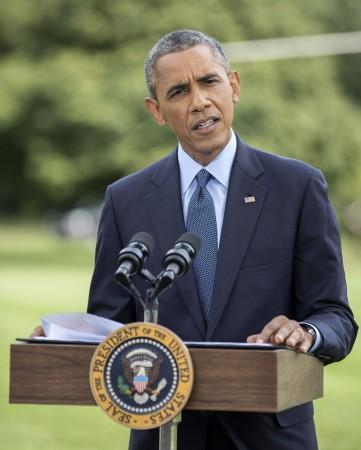
The United States and the European Union has agreed to slap Russia with the toughest sanctions yet, against Moscow's alleged support for the pro-Russian separatists in East Ukraine.
The new sanctions, which Obama claimed with make Russia's "weak economy even weaker" target state-owned banks, imposing an arms embargo and clamping down on sales of sensitive technology and the export of equipment for the country's oil industry.
The punitive measures, thought to be the most extensive EU sanctions on Russia since the Cold War era, were agreed by ambassadors from the 28 member states after a seven-hour debate Tuesday.
They said Moscow had not fulfilled the obligation laid down by foreign ministers last week that Russia stops its support for separatist militants, end the supply of arms to the rebels and provide full cooperation in the investigation of the downed Malaysian airlines flight MH17.
US president Barack Obama was quick to join the EU in sharply intensifying the economic pressure on Moscow in response to the growing conflict in Ukraine. He announced new measures that target major sectors in Russian economy including the areas of weapons, energy and finance, the Guardian reports.
The new restrictions including banning Americans or people in the United States from banking with three main Russian banks: VTB Bank OAO, Bank of Moscow and the Russian Agricultural Bank. The BBC reports citing Obama's announcement that the aim of such measures was to increase the cost to Russia of its continued support for pro-Moscow rebels.
"Today, Russia is once again isolating itself from the international community, setting back decades of genuine progress," the president said in a conference.
"If Russia continues on this current path, the costs on Russia will continue to grow," he added.
In a joint statement, the president of the European council, Herman van Rompuy and the head of the European Commission, Jose Manuel Barroso described that the EU measures were a strong warning that "Illegal annexation of territory and deliberate destabilisation of a neighbouring sovereign country" could not be tolerated in 21st century.
"When the violence created spirals out of control and leads to the killing of almost 300 innocent civilians in their flight from the Netherlands to Malaysia, the situation requires urgent and determined response," they said, adding:
"The European Union will fulfil its obligations to protect and ensure the security of its citizens. And the European Union will stand by its neighbours and partners."















